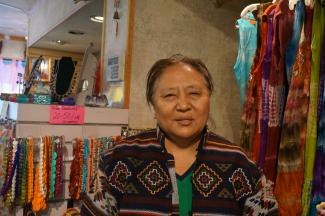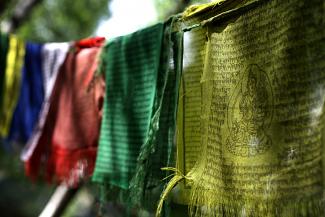

Tucked away in the heart of Porter Square in Cambridge, MA, the Tibet Arts Gallery provides a calming and spiritual presence for all who visit. Run by entrepreneur and Cultural Survival Bazaar vendor Bomdonn Ngodup, Tibet Arts Gallery buys directly from Indigenous Tibetan and Himalayan artisans in order to maintain and celebrate their Indigenous culture and heritage. Ngodup has a long interest in working with Tibetan refugees, as she and her family were once refugees themselves, but she says that the seed for the Tibet Arts Gallery was planted long before that time in India. “My parents, with whom my siblings and I had escaped from Tibet, eventually settled in as street vendors as their main occupation in India. They ran a small scale operation buying arts and crafts from newly arrived Tibetan refugee artisans and selling them on the streets of Kangra, a small town in the rural part of North India.” As a young adult Ngodup says she felt deeply responsible for her family and became heavily involved in the running of her parents’ business. It was there that she “met lots of interesting people and found a deep appreciation for the arts and crafts of my Tibetan heritage.”
Working with Tibetan and Himalayan refugees has always been the backbone of Ngodup’s work, and even before opening Tibet Arts Gallery she had extensive contacts and experience with artisans in the Indigenous communities in Tibet, Nepal, and India. She buys directly from the artisans and lets them set their own price, and with that she decides how much stock she can carry in her store. “I have always believed in being a fair and conscientious entrepreneur. So you will see that reflected in the affordable prices I charge my patrons,” she says. “My goal in starting Tibet Arts Gallery has always been to help Tibetan and Himalayan artisans maintain their way of life. I feel fortunate that I have been able to live my dream.”
Tibet Arts Gallery has been doing business in Porter Square for almost 20 years, and Ngodup has been a Cultural Survival Bazaar vendor for nearly as many years. Her first Bazaar was in 1996, and she says it was there that she “met and befriended people from all around the world and gained a tremendous appreciation for rich diversity of other cultures and nations,” and fell in love with the “vibrant ambiance that typically surrounds Cultural Survival fairs.” When asked why she thinks it is important to maintain Himalayan arts and culture, Ngodup’s answer is simple and profound: “Preserving arts and culture is important. It serves as a reminder of the diversity of our civilization, our world heritage. A lot of nuanced details and customs can be seen in the arts and crafts. If culture is the final dish, then arts and crafts would sort of be the main ingredient. In that respect, Himalayan arts and culture is important to support and maintain. The Himalayan region has a rich history and beautiful culture. So I think it’s important for people to appreciate and support that.”
Tibet Arts Gallery is located at 1925 Massachusetts Avenue in Cambridge, MA, tibetartsgallery.com.



